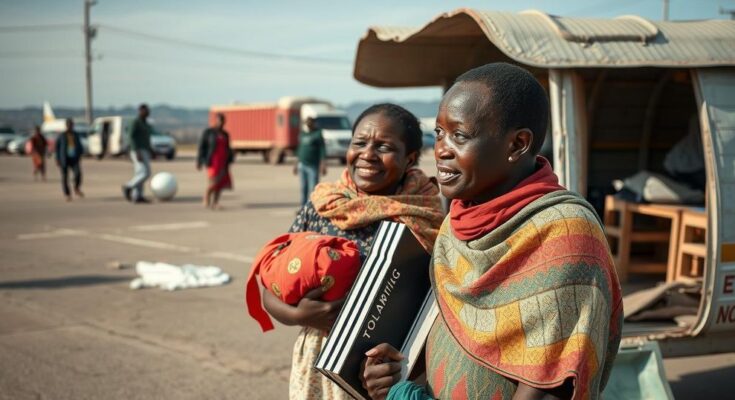An influx of refugees from Mozambique due to post-election violence has led approximately 13,000 individuals to seek refuge in Malawi. Amidst significant political unrest following the October 11 elections, many families are fleeing violence and destruction, recalling previous refugee waves during civil conflicts. Local and international agencies are working to support both refugees and host communities amidst ongoing food shortages in Malawi.
On a recent Saturday, Manase Madia, a 50-year-old Mozambican, presented his identity card, which once symbolized pride but now serves as a reminder of his perilous situation. Following months of violence in Mozambique, where houses have been destroyed and businesses plundered, he is among approximately 13,000 individuals who have fled to Malawi seeking safety. This exodus harkens back to the civil war era when nearly one million Mozambicans sought refuge in Malawi during the late 20th century.
The unrest intensified after the October 11 elections in Mozambique, which declared Daniel Chapo of the ruling Frelimo party as the victor against Venâncio Mondlane of the opposition. Subsequent rulings by Mozambique’s constitutional council led to renewed violence, initially targeting political figures but later escalating into widespread criminality and looting primarily affecting affluent members of society, including Madia. After receiving threats that he was a target, Madia fled with his family on a motorbike, witnessing destruction of property and theft of livestock.
Madia shared that many of his relatives remain in hiding due to the violence, highlighting the pervasive fear among communities. Others who attempted the arduous 30-mile journey to Malawi did so with little more than the clothes on their backs, having lost their possessions in the chaos. Despite facing its own struggles with severe food shortages, Malawi has welcomed these refugees, drawn together by a shared language and the humanitarian spirit.
Local authorities, alongside the UN refugee agency, are mobilizing resources to provide shelter, food, and necessary health services to the displaced individuals. Hilda Katema Kausiwa, an operations manager at Malawi’s Ministry of Homeland Security, remarked on the collaborative efforts to assess hygiene and health conditions in the refugee camps. Approximately 46 hectares of land have been allocated for developing facilities to accommodate these individuals.
Local leaders have expressed concern over the strain the influx of refugees places on already limited resources. Mike Dansa, chair of Nsanje civil society organizations, emphasized the importance of comprehensive support systems for both refugees and host communities to address immediate needs and ensure long-term stability amidst this crisis.
The current refugee crisis in Malawi derives from violent upheavals in Mozambique following a controversial election. As political unrest escalates into widespread violence, many Mozambicans, fearing for their lives and livelihoods, have fled to neighboring Malawi. The historical context of refugee movements between the two nations underscores the severity of the situation, echoing past civil conflicts. Malawi faces its own challenges, including a state disaster declaration due to food shortages stemming from recent droughts, creating a complex situation where humanitarian responses must consider both the needs of refugees and the local population. International aid organizations are mobilizing to assist in this unprecedented humanitarian challenge.
In conclusion, the ongoing influx of Mozambican refugees into Malawi highlights the significant humanitarian crisis emerging from political violence. The government’s collaborative efforts with international agencies to accommodate and support the displaced individuals demonstrate a commitment to assist those fleeing persecution. However, the situation imposes substantial pressure on Malawi’s local resources, necessitating sustained international support to address both immediate and long-term needs effectively.
Original Source: www.theguardian.com




